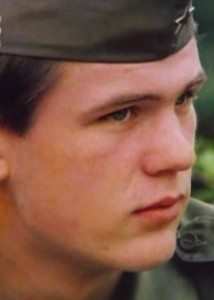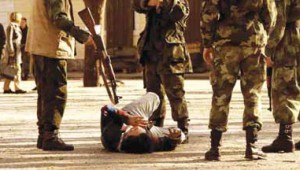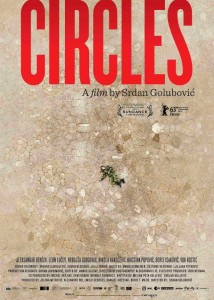Belgrade Honours Srdjan Aleksić, A Bosnian Serb Whose Bravery Inspired New Film
 Bad deeds can be recalled so easily, while the humane acts of individuals can be often forgotten. But even in the darkest hours of war, when so much pain and anguish is felt by all sides, the shining bravery of one young man can be an inspiration to so many.
Bad deeds can be recalled so easily, while the humane acts of individuals can be often forgotten. But even in the darkest hours of war, when so much pain and anguish is felt by all sides, the shining bravery of one young man can be an inspiration to so many.
Twenty years ago, soldiers from the Army of Republika Srpska (VRS) beat to death a young Bosnian Serb Srdjan Aleksić, who was shielding his Muslim friend. Since his brutal killing, Srdjan has been hailed as a hero in towns across the Balkans.
This month, the story of the amateur actor and promising sports star has taken a fresh turn, as a Serbian film based on his life receives critical acclaim and standing ovations at festival screenings, and Belgrade officials bow to people pressure and agree to name a city street in Srdjan’s honour.
Young Man Beaten To Death By VRS Soldiers
On that fateful day, VRS soldiers had been checking the ID of shoppers in Trebinje, in the south of Bosnia & Herzegovina, when they discovered a young Bosnian Muslim man, Alen Glavović. As they started to beat him, Alen’s friend, Srdjan, ran to his defence. But the soldiers turned their anger on Srdjan, beating him unconscious with their rifle butts and boots, as police looked on. Soon after, Srdjan fell into a coma and died from his injuries. He was aged 26.
Thanks to Srdjan, who was a teenage swimming star and junior record holder in the former Yugoslavia, Alen Glavović survived the war and lives in Sweden with his wife and two children. Every year, he makes a pilgrimage to Srdjan’s grave and to visit Rade in Trebinje. One of the attackers was killed in war, while the others were sentenced to 28 months in prison. The surviving killers still live in Trebinje, where Srdjan’s father Rade sometimes sees them walking in the same market where they took the life of his son.
In recognition of his humane act of bravery, Srdjan was posthumously awarded the Charter of the Helsinki Committee for Human Rights in Bosnia and Herzegovina. Last year, former Serbian president Boris Tadić posthumously awarded Srdjan the Miloš Obilić Gold Medal for ‘acute courage and an act of personal heroism’, and then Milorad Dodik, president of Republika Srpska, the Bosnian Serb entity in which Trebinje is situated, posthumously awarded him the Golden Medal of Honour of Republika Srpska.
Facebook Petition Wins Over Belgrade Officials
This week, Belgrade city officials acknowledged the thousands who signed a petition calling for a street to be named after Srdjan Aleksić. Campaigner Suzana Milosavljevic Ilijić generated two thousand signatures via a Facebook group and online petition in her crusade to honour Srdjan. “Our online petition has been signed by more than 2000 people, among them many journalists, artists, curators, and other representatives of the main cultural institutions in Belgrade and Serbia, as well as many people from other cities in the region,’ Suzana told Wild Rooster. “The 20th anniversary of his tragic death, followed by increased media attention, was an ideal occasion for launching the petition with a request to Belgrade authorities to name one of the streets after Srdjan Aleksić.”
It had been hoped that the chosen street would be in the city centre or an area of youth culture, but city regulations would seem to prevent that. While no decision has been made on where the street will be, areas of growth, such as Zemun, New Belgrade or Voždovac, are the most likely candidates.
“Srdjan is already an unofficial hero in Belgrade and he deserves to have a street not only in Belgrade, but in many other towns in the region as well,’ Suzana said. “His name is a symbol of humanity that was rare during the war. I hope that this street will remind all of us of the importance of empathy, solidarity, humanity and love for one another, regardless of ethnicity and other differences.”
Belgrade Follows Other Cities in Honouring Srđan Aleksić
This decision from Belgrade comes after Sarajevo, Novi Sad, Podgorica, Tuzla, Mostar, Bihac and Foca have already either named streets after Srdjan or agreed to honour him in similar ways. In his hometown of Trebinje a sports complex has been named after him, while the Leotar Swimming Club, of which Srdjan was a member, organises an annual memorial swim.
A proclamation in Sarajevo states: “Without people like Srdjan Aleksić and his heroic deeds, one would lose hope in humanity, and without it our life would have no meaning.”
Some have questioned why it took so long for Belgrade to recognise this young man. For Suzana, it is better late than never. “I think that it is never too late to recognise the true values of someone like Srdjan,’ said Suzana.
Aleksić Inspires Film From Director Srdjan Golubović
Serbian director Srdjan Golubović, whose new film, Circles (Krugovi), is heavily inspired by the life of Srdjan Aleksić, sent a similar request to the authorities in Belgrade. “For this city and the country it is important to acknowledge that one man’s supreme act of heroism can promote human values in the time of evil,’ Golubović said. “Aleksić is a true hero of our time. He was my personal hero of this war, the hero of my generation, so I wanted to do something about it.”
 Golubović had wanted to make a film that explores whether brave acts can encourage others to make a stand or if their impact is lost after the moment passes, he said prior to the film’s Belgrade premiere.
Golubović had wanted to make a film that explores whether brave acts can encourage others to make a stand or if their impact is lost after the moment passes, he said prior to the film’s Belgrade premiere.
As the credits rolled, the audience stood as one, turned to Srdjan’s father Rade Aleksić, and burst into spontaneous applause. Former Serbian president Boris Tadić was also at the FEST screening.
Sundance Film Festival Award For Circles

Circles, which stars Alexander Berček, Nebojsa Glogovac, Vuk Kostic, Nicholas Rakocević and Leon Lucev, received its world premiere at the Sundance Festival, where it was awarded a special jury prize in the official competition for world cinema. Soon after, the film won the Ecumenical Jury Award as best film in the Forum at the Berlin Film Festival.
Golubović, who graduated from the Faculty of Dramatic Arts in Belgrade, came to international attention when his previous film, The Trap, won 23 international film awards and was shortlisted to be nominated for an Oscar for best foreign film.
Srdjan’s father Rade Aleksić has said that, while he is undeniably proud of what Srdjan did that day in 1993 and he believes that his son’s bravery should be remembered as an inspiration to others, he does not believe that Srdjan should be seen as a hero. “He died doing his humane duty,’ Rade said in his son’s obituary, with admirable understatement.


No comments yet.
Be first to leave your comment!